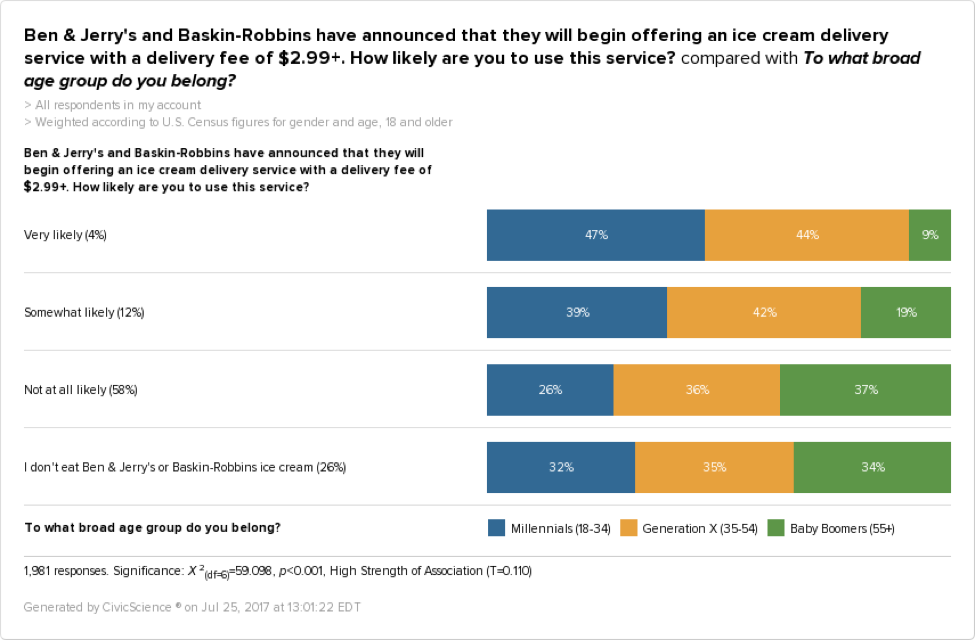The Gist: Although 16% of people say they are at least somewhat likely to try an ice cream delivery service, 58% of respondents say they are not at all likely. Interestingly, these 58% are more likely to care about environmental issues. Promoting socially conscious values may be the way to go if ice cream companies want to persuade these consumers to use their delivery services.
I scream, you scream, we don’t all scream for ice cream…or at least not for the idea of it turning up at our door.
In the early half of July, Baskin-Robbins announced a shiny new ice cream delivery service. They will partner with DoorDash, who will use insulated carriers to deliver ice cream for a fee starting at $2.99.
Not to be outdone, Ben & Jerry’s, which has already partnered with OrderUp and GrubHub in select cities, announced their own in-house delivery service. This service promotes buying their famous flavors in bulk. Consumers purchase pints directly from the Ben & Jerry’s website and pay a flat rate shipping fee of $19.
We were curious to find out who would be interested in having ice cream delivered directly to them, and, honestly, it wasn’t very surprising.
We Scream
Only 16% of respondents said they were at least somewhat likely to try an ice cream delivery service. And yes, of that 16%, Millennials were highly represented.
Only 4% answered that they were very likely to try an ice cream delivery service, and Millennials made up a majority of that group, with Generation X claiming a close second.
Of the 12% who said they were somewhat likely to try this service, the majority were Gen X, and Millennials came in a close second.
Those who are at least somewhat likely to try an ice cream delivery service are also more likely to use Twitter and Instagram and make purchases based on what they’ve seen on social media. They are also less likely to live in a rural area, more likely to be women, and more likely to subscribe to Verizon Wireless or T Mobile.
I threw the cell phone carrier tidbit in for some flavor, because the rest of these findings just aren’t that surprising. This is very similar to the group of people who are likely to use a meal kit delivery service, as we’ve discussed in a blog post last year. They’re younger, tech-savvy, suburban or urban, and female.
In general, this group would respond well to a social media marketing campaign.
We Don’t Scream
In contrast, 58% of ice cream eaters answered that they are not at all likely to use an ice cream delivery service. But who is this 58%?
Baby Boomers are the majority in this group, but only by 1% over Gen X. Millennials still make up over ¼ of this group of people.
Generally, this group is more likely to use reusable shopping bags, donate to health charities, and be more environmentally conscious. Oh, and subscribe to Sprint Wireless.
Is it possible, that the way to reach out to this large chunk of persuadable consumers is to promote environmentally friendly practices and values? If so, then Ben & Jerry’s could be on the right track.
Socially-Conscious Ice Cream
In researching for this blog post, I explored both the Baskin-Robbins and Ben & Jerry’s websites. While Baskin-Robbins doesn’t mention their company values, Ben & Jerry’s is not shy about the company’s belief in environmental conservation. Below is a clickable image taken from the values page of the Ben & Jerry’s website:
Image Credit: BenJerry.com
They also keep an active blog where they discuss Al Gore’s An Inconvenient Sequel, the Environmental Protection Agency, and climate change, along with providing yummy recipe ideas.
So What Now?
It stands to argue that if Ben & Jerry’s were to promote its values in its advertisements, the company could win over some of this large group of people who say they’re unlikely to use ice cream delivery services. This goes for Baskin-Robbins as well.
In the era of the socially-conscious consumer, this may be the way to go.










